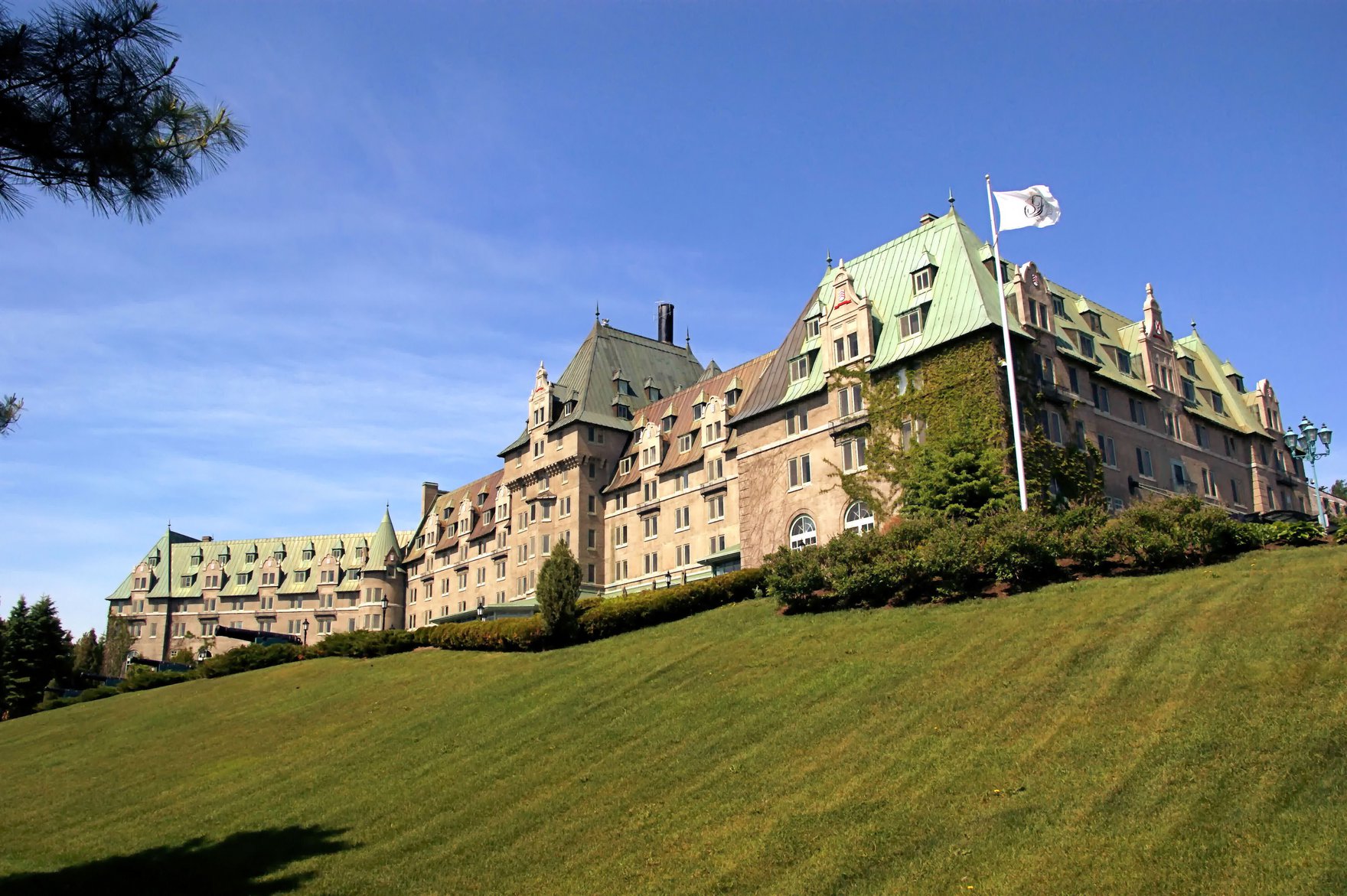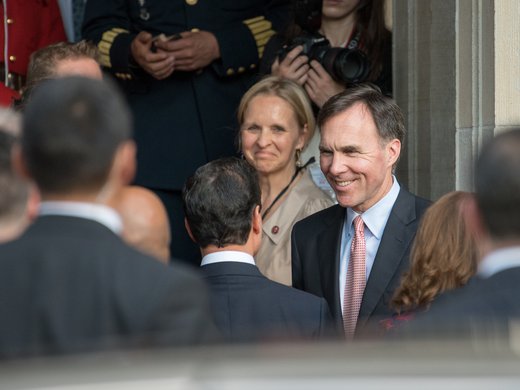Next year, Canada will host its sixth Group of Seven (G7) summit, to be held on the banks of the St. Lawrence River in the Charlevoix region of Quebec. From June 8 to 9, the leaders of the world’s most advanced economies — the United States, the United Kingdom, Germany, France, Italy, Japan and Canada, in addition to representatives from the European Union — will meet as they do every year to discuss and attempt to build consensus around today’s most challenging global issues.
Despite the hefty price tags, the annual summits are valued by prime ministers and presidents as an opportunity for frank and open discussion behind closed doors.
While Canada technically assumes its year-long presidency on January 1, 2018 — from Italy, last year’s chair — the Trudeau government is already in full-on planning mode, and has secured agreement from other G7 countries on an agenda that will feature four broad areas of focus: investing in inclusive growth, advancing gender equality, addressing climate change and strengthening peace and security. (A fifth, around jobs of the future, was named on December 14.)
The man at the helm of Canada’s strategy is Peter Boehm, deputy minister for the G7 summit (formerly Canada’s ambassador to Germany and a career foreign service officer). As Justin Trudeau’s personal representative — or his “sherpa” — Boehm reports directly to the prime minister, and is in regular contact with his other G7 counterparts.
In 2010, the Group of Twenty summit in Toronto made international headlines for all the wrong reasons: violent protest, hundreds of arrests and the violation of civilians’ rights by police. That year’s Group of Eight (G8) summit, held in Huntsville, Ontario, was also criticized for the government’s mismanagement of funds and an overall lack of transparency and accountability.
As a result of recommendations by the federal auditor general, the entirety of the 2018 Charlevoix summit — its planning, agenda, logistics and security — will fall under one minister’s responsibility.
It’s a big job, but this isn’t Boehm’s first rodeo. He holds the distinction of being the second-longest-serving G7 sherpa, having assisted former Prime Minister Stephen Harper during various G8 and G7 summits. (The G8 became the G7 after Russia was suspended in 2014 following its annexation of Crimea.) Boehm and Germany’s Chancellor Angela Merkel — herself a stalwart of politics, now in a fourth term — ask each other the same question whenever they meet: “Are you still here?”
On December 7, as part of an expressed desire by Trudeau that the 2018 summit and its planning be transparent, inclusive and informed by input from a broad range of perspectives, Boehm participated in a dialogue on Canada’s G7 presidency at the University of Toronto, an event jointly hosted by the Canadian International Council, the Munk School of Global Affairs and Trinity College’s G7 Research Group.
Boehm has already taken part in similar events in Vancouver and Quebec City, and more are to come in the new year. The goal is not only to hear from Canadians on issues that are important to them but also to “demystify” the G7 and how the group’s process works.
An Ambitious Agenda
In an interview with OpenCanada ahead of the University of Toronto event, Boehm laid out the government’s priorities for its 2018 G7 presidency.
Along with inclusive economic growth — which has in the past been the G7’s main raison d'être — and a traditional focus on security issues, Boehm was enthusiastic about an agenda that will highlight gender equality and climate change.
“We’re going to mainstream gender equality throughout what we do…we strongly believe that initiatives should be channelled in that way,” said Boehm, who in his previous role as deputy minister of international development was heavily involved in the engineering of Canada’s new feminist international assistance policy.
Later, to the audience at the University of Toronto — which broke out into applause at this announcement — Boehm elaborated. “Everything that we’re going to do, we’re going to process through a “gender-based analysis plus” approach. So that means that when finance ministers are meeting…they’re going to be looking at a gender-based budget. As we look at the jobs of the future, the impact of climate change and environmental policies — gender equality is an element there.”
“We strongly believe that sexual and reproductive health rights are important for women and girls, not just in development policy but all the way through,” Boehm said, adding that Canadians should expect an announcement with more details on the government’s gender equality strategy before the end of the year.
On the issue of climate change, the event audience was even more receptive. As part of the government’s plan to further youth engagement and harness social media, attendees were encouraged to use their smartphones to participate in an online survey. “Climate change” was the top answer to “In your opinion, what is the single most important issue for the G7 to address?”
Boehm told the crowd that the government considers climate change to be “one of the great existential issues of our time,” and is committed to implementing the 2015 Paris Agreement “in all of its aspects.”
In addition to Canada’s broader agenda goals, Boehm expects a host of other topics to come up, such as North Korea, cyber security, Indigenous issues and mental health.
The Elephant at the Summit
Of course, professed approval from a small sampling of Canadians is one thing — the real question hanging in the air is this: How can Canada ensure its G7 goals are achieved, when so many of those goals are at odds with views expressed by US President Donald Trump?
The May 2017 summit in Taormina, Italy, pitted Trump against his G7 counterparts on climate change, with Merkel announcing days later that, with regard to the global challenges of the day: “The times when we could completely rely on others are, to an extent, over.”
Canadian Foreign Affairs Minister Chrystia Freeland too emphasized in the month following the summit that the United States’ questioning of its “mantle of global leadership” showed a “need for the rest of us to set our own clear and sovereign course.”
Echoing Freeland, Boehm stressed to the audience Canada’s belief in multilateralism, progressive trade and a “very strong, rules-based international system.” He was frank in his acknowledgement that the Trump administration’s “America First” policies could result in a “pretty lively discussion” and disagreement over “the nitty-gritty.”
“The G7 is a collective, it’s not a global government,” Boehm told OpenCanada. “Yes, we’re going to have differences — we wouldn’t be having these meetings if we were all agreed on everything.”
During the Q&A portion of the December 7 event, Hélène Emorine, co-chair of the G20 Research Group at the University of Toronto, asked Boehm how he intended to ensure that, on climate change, a unified G7, rather than a “G6+1,” emerged next year at Charlevoix.
“I don’t think, to be very candid, if I can with this group, that isolating one member on one issue necessarily works,” Boehm said, adding that in his view, there needs to be recognition that the subject of climate change can extend beyond the Paris Agreement to discussion on oceans, the biosphere, challenges facing coastal communities, and resilience and infrastructure issues.
In a strategy similar to the Trudeau government’s multi-pronged outreach ahead of and during renegotiations on the North American Free Trade agreement, Boehm said Canadian officials are engaged with their US counterparts on “all fronts, at the subnational level and the senior bureaucratic level.”
“In fact, I had a phone call with my US counterpart just this afternoon,” Boehm said. “[Canada is] not shirking. We’ve got our principles, and the things that we want to push forward — the other countries do as well. But I think we can have a pretty robust and good dialogue on that.”
On gender equality — an area where some experts worry that more specific issues, such as sexual and reproductive health rights, risk getting pushed off the agenda — Boehm also acknowledged that Canada’s desire to go beyond women’s economic empowerment to social policy areas such as women’s health, educational opportunities and gender-based violence, is not shared by all G7 countries.
“In my conversations in the various capitals with fellow sherpas and others, including stakeholder groups, some of the countries — I’m not going to mention them, you can probably figure them out — are more on the ‘yes, women’s economic empowerment...let’s push on that’ [side],” Boehm said. “And we’re saying, well no, it’s got to be broader, it has to be on the social side as well.”
Boehm said that every governmental working group in Ottawa tasked with discussing ideas around what Canada will want to put forward in its presidency year will have a gender equality expert embedded in it.
Boehm added that a focus on gender equality beyond economic policy is something that Canada would like to see continue beyond its 2018 presidency. “We want to get this all embedded in the thinking,” Boehm said, “and that means that [next G7 chair] France in 2019 would be pursuing this as well. I think President [Emmanuel] Macron is quite open to that.”
Defining Success
During the Q&A, Amanda Sussman of Plan International asked Boehm how focused Canada will be on a “tangible outcome” for next year’s summit. Boehm responded that Trudeau’s vision for Canada’s presidency didn’t necessarily include the announcing of a concrete initiative, like the Maternal, Newborn and Child Health initiative that came out of the 2010 summit, or a major financial pledge, like the $12.9 billion promised in Montreal at last year’s replenishment conference of the Global Fund to fight AIDS, tuberculosis and malaria, noting that recently he has detected traces of fatigue in the international donor community.
Rather, the focus will be on a “broader consultation” with civil society. “If, in the discussions that we have, collectively, something starts to gain momentum,” Boehm added, “then we’re going to want to own it.”
On the possibility of Canada’s best-laid plans being derailed by an unpredictable US administration, Boehm said: “The leaders are really only together for about 48 hours, so are we going to solve all the problems in the world? No. Can they have a good discussion and push things forward? Yes. Can they convince some of the more recalcitrant leaders that maybe they should be a bit more open-minded? There’s a good possibility of that too.”
Reflecting on hopes for Canada’s presidency, Boehm said that from what he has seen in travels outside of Canada, “expectations for us are sky-high.”
If Canada is able to meet these expectations “at least partway…then we will have a success, in my view.”
This piece was first published on OpenCanada.org.



